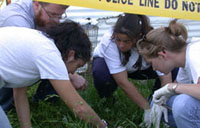Note: If you feel that you have located evidence or material of forensic importance, it is important that you do not disturb it and immediately contact your local law enforcement agency.
 We’re preparing students for more than a career as a crime scene investigator, like those glamorized on popular television programs. Here at Texas A&M University, the Forensic and Investigative Sciences program prepares students for careers that involve the collection, preservation, processing and use of evidentiary information to solve problems.
We’re preparing students for more than a career as a crime scene investigator, like those glamorized on popular television programs. Here at Texas A&M University, the Forensic and Investigative Sciences program prepares students for careers that involve the collection, preservation, processing and use of evidentiary information to solve problems.
TAMU listed as best college for undergraduate forensic science!
 CSI might be the first thing that comes to mind, but also think law, medicine, homeland security, public safety, political science, environmental quality, agriculture, public health, chemistry, anthropology, physics, computer science and business.
CSI might be the first thing that comes to mind, but also think law, medicine, homeland security, public safety, political science, environmental quality, agriculture, public health, chemistry, anthropology, physics, computer science and business.
Forensic and investigative scientists rely on state-of-the art scientific discoveries and technologies as tools to help them answer critical questions in a variety of settings. Drawing on information from an organism’s environment and ecology—sometimes right down to the molecular level—they analyze and interpret evidence in industrial, regulatory, legal, medical and associated professions.
Anyone desiring to enter this field should be aware that background checks similar to those required for law enforcement officers are likely to be a condition of employment as a Forensic Scientist (Reference: NIJ Report NCJ 203099 – “Qualifications for a Career in Forensic Science,” pp.710). If you are uncertain about your ability to pass a background check, you may wish to discuss your concerns with the the academic advising staff.